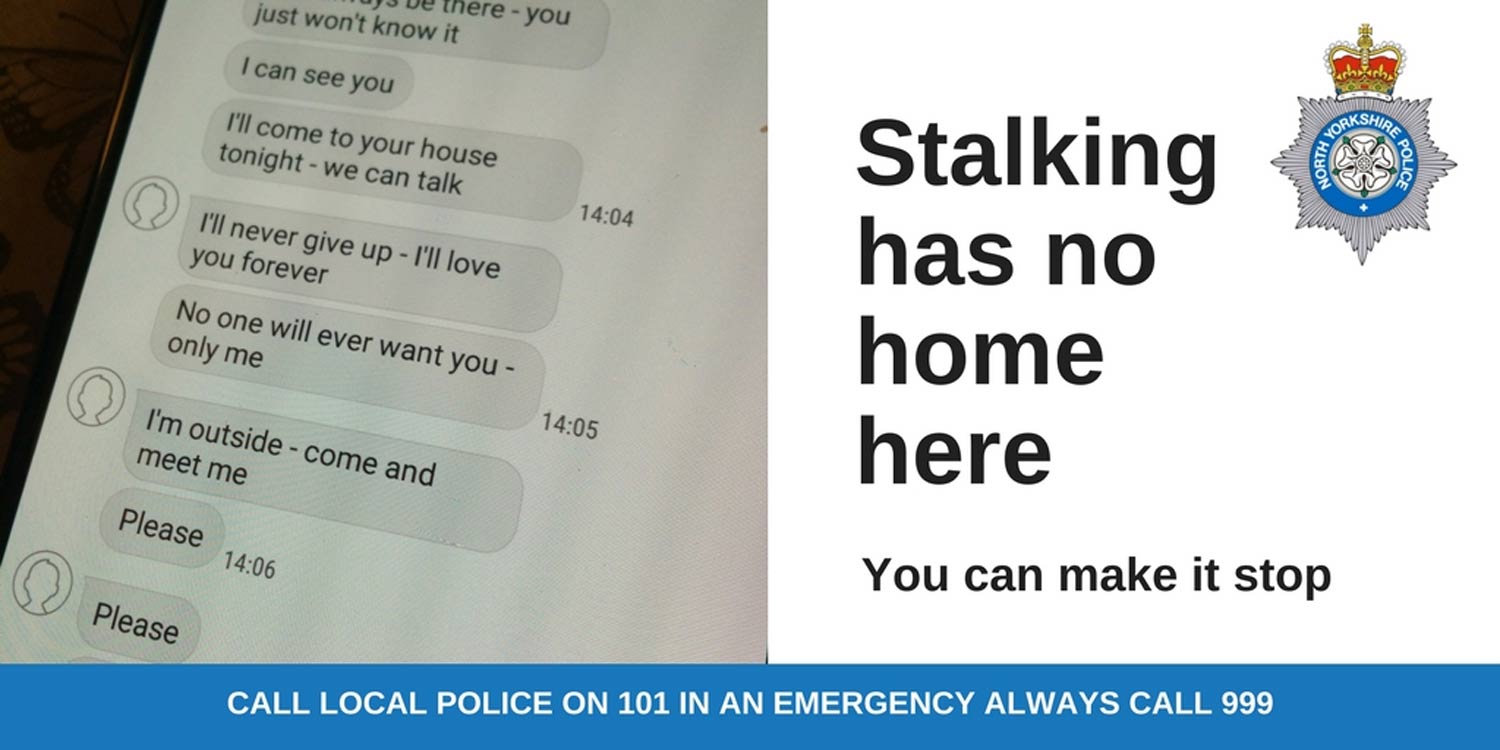North Yorkshire Police’s NO HOME HERE campaign continues in February with the focus on harassment and stalking.
These sickening offences have NO HOME HERE in North Yorkshire – but would you know if it was happening in your community?
Would you even realise if you, a family member or a friend had fallen victim to these types of crimes?
Throughout February, North Yorkshire Police will be raising awareness of harassment and stalking, with an aim of generating an understanding of what constitutes these crimes and what to do if someone thinks they are a victim, or knows someone who might be.
Harassment and stalking are crimes of persistence and can also often be crimes of control. This is particularly the case when the victimisation is associated with a current or previous controlling and coercive relationship.
Harassment is defined as physical, verbal and non-verbal actions directed at or towards a person by another, which causes that person alarm, distress, fear and/or a fear of violence.
Stalking is a pattern of repeated, unwanted behaviour that causes a person to feel distressed or in fear. It is persistent and unwanted contact from an individual that caused someone to feel upset.
Stalking can take many different forms including being followed, spied on, loitering nearby and having your property interfered with, as well as being contacted by telephone, letter, email or via social media.
Stalking is often described by victims as “mental rape”.
The crucial difference between stalking and harassment is that stalking is described as a pattern offending behaviour which causes a victim “serious alarm or distress that has a substantial adverse effect on their usual day-to-day activities”.
In North Yorkshire, between 1 July 2016 and 30 June 2017, there were 886 harassment crimes recorded across the county. This figure is more than double the number of harassment crimes recorded for the same period in 2012/1, which was 387.
The number of crimes recorded for stalking between 1 July 2012 and 30 June 2013 was 11. For the same period in 2016/17, the figure had increased by 41 to a total number of 52 crimes – that’s nearly five times as many stalking crimes there were since the stalking legislation was introduced in 2012.
Temporary Detective Superintendent Allan Harder, Head of Safeguarding at North Yorkshire Police, said:
Victims of harassment and stalking crimes are often vulnerable and have frequently suffered the actions of perpetrators over a long period of time.
Many are survivors of domestic abuse, who leave coercive and controlling relationships only to become the victims of an extension of this behaviour by way harassment and stalking.
Harassment and stalking are serious crimes that have a colossal impact on the victims’ emotional wellbeing.

T/Det Supt Harder added:
Nobody in our communities should feel harassed or stalked. It is simply not acceptable. The ex-boyfriend or ex-girlfriend that calls you fifty times a day and follows you home making you feel scared and fearful of your safety – they are committing a crime and you should tell the police about their behaviour.
“The number of incidents of harassment and stalking have risen over the last five years, and we think this is because people are becoming more confident in reporting these crimes, recognising the law surrounding these types of behaviour and knowing that support is available to them.
We also believe that police officers are becoming more aware, through training and briefings, of how to recognise a pattern in an offender’s behaviour which constitutes harassment or stalking.
North Yorkshire Police’s NO HOME HERE campaign is all about educating the public about crimes which affect those who are most vulnerable in our communities, and encouraging people to help make it stop by reporting it to the police or other agencies who are on hand to provide professional help and support.
How to recognise the behaviour of stalkers
Here is a list of types of stalkers which will help victims and the wider community to recognise the behaviours associated with stalking and encourage them to seek help.
Rejected by victim
The victim is a former intimate partner. These stalkers will deny the end of the relationship. They are often sane but angry. They will respond to sanctions but believe that they are entitled to their partner. Early intervention is important to prevent the stalking and to protect the victim.
Intimacy seeker
Intimacy stalkers believe they are in a relationship with their victim. This fictional pseudo relationship can be with anyone. Such a relationship can develop with anyone with whom they have had contact with. Such victims can range from a dentist to a celebrity.
Incompetent suitor
Such stalkers will not have the skills to pursue a relationship, but do so anyway. They do not have the basic skills to develop and maintain a relationship. These stalkers are resentful, often typified by targeting professionals who have let them down whom they blame them for everything that has gone wrong with them. They seek to terrify and control.
Cyber stalkers
Cyber stalking is threatening behaviour or unwanted advances directed at another using the internet and other forms of computer communications. This may take the form of identity theft, posting false profiles, provoking others to attack others by attacking the victim, direct threats through email and messaging.
Gather evidence
If someone thinks they are being stalked then it is recommended they contact the police or support agencies so that investigations can commence, and the necessary safety advice can be given.
It’s a good idea to gather evidence of the stalking you are experiencing by writing down as much information as you can about the incidents and document what it happening to you.
Evidence can include phone records, emails, text messages, screenshots of any social media posts or pages, messages, letters or gifts.
It’s also helpful to keep a diary of the incidents connected to the stalking and write your thoughts and feelings down as soon after the incident as possible to record how it made you feel at the time.
How to report harassment and stalking and where to get help
To report harassment and stalking, please call North Yorkshire Police on 101, press 1, and speak to the Force Control Room. Alternatively, you can dial 101, press option 2 and ask for your local Neighbourhood Policing Team. Contact details for Neighbourhood Policing Teams can be found on the website www.northyorkshire.police.uk.
If you feel threatened and are in immediate danger, always call 999 for an emergency police response.
There are other helplines and agencies you can contact in relation to stalking.
National Stalking Helpline
Telephone:
Email: advice@stalkinghelpline.org
Website: www.stalkinghelpline.org
Paladian -Stalking Advocacy Service







